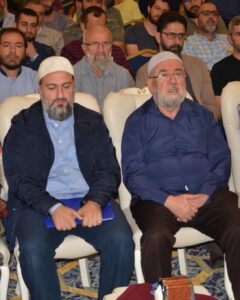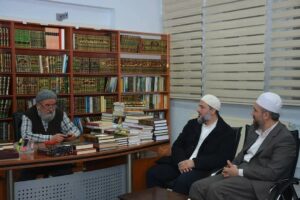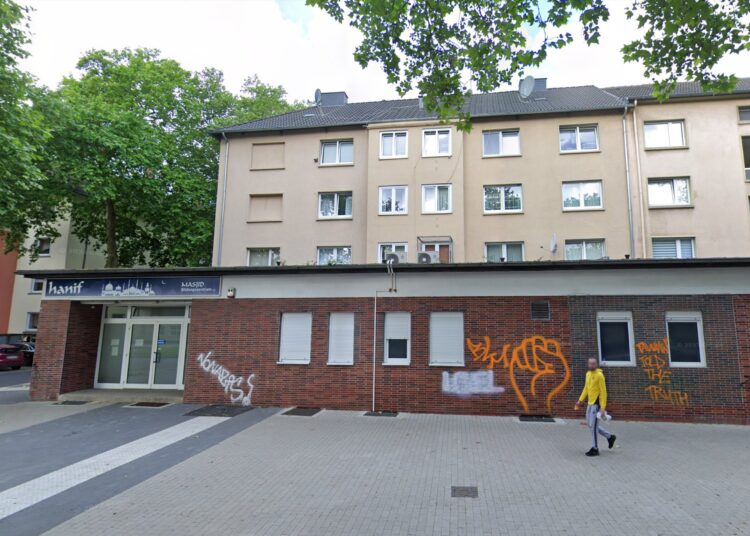Abdullah Bozkurt/Stockholm
A radical imam, whose teachings have inspired numerous jihadists, including the assassin of a Russian ambassador to Turkey, has expanded his influence in Germany, home to a Turkish diaspora of approximately three million.
Hüsnü Aktaş, a 73-year-old cleric with a history of imprisonment for radical activities, has established strong connections with Germany-born imam Muharrem Çakır, according to a Nordic Monitor investigation.
Çakır, a 50-year-old Turkish cleric, was mentored within Aktaş’s ideological circle in Turkey during his formative years, which profoundly shaped his worldview. A staunchly anti-Western and anti-American figure, Çakır openly shares his views on social media platforms.
Çakır leads a congregation known as Hanif in Germany, to whom he regularly delivers sermons in both Turkish and German. He shares these sermons on YouTube and frequently travels to Turkey to meet with Aktaş, exchange ideas on coordinated activities and deliver speeches.

Operating under the German organizations Hanif Sport-und Kulturverein e.V. and Hanif Moschee Bildungszentrum e.V. in Dortmund, North Rhine-Westphalia, Çakır has been actively promoting Aktaş’s ideology within Germany’s Muslim communities, which are predominantly Turkish.
This development poses significant challenges to Germany’s national security, given Aktaş’s troubling history. He has radicalized numerous individuals, advocates for the establishment of a caliphate and actively encourages his followers to engage in jihad. Aktaş is also vehemently antisemitic, frequently promoting conspiracy theories about Jewish communities in his speeches.
Aktaş first faced trial for his radical views and activities in 1969, while attending the theology faculty at Ankara University. He was arrested again on November 28, 1984, on similar charges and brought before a military court but was released pending trial on December 12, 1985. Undeterred, he continued his radical pursuits, founding the Vahdet (Unity) Foundation (Vahdet Eğitim Yardımlaşma ve Dostluk Vakfı) on July 1, 1988.
The foundation led by Aktaş was later implicated in aiding and abetting a Chechen group that hijacked a ferry in January 1996 as it was about to depart from the Black Sea province of Trabzon for Sochi. The 1997 indictment against Aktaş and his Vahdet Foundation revealed that the hijackers had received assistance from the organization.

The hijackers held 177 passengers and 55 crew members hostage aboard the ferry, diverting it to Istanbul to draw attention to the plight of Chechens in Russia and demand the release of Chechen fighters besieged by Russian forces. After a 72-hour standoff, all of the perpetrators were arrested. While they were tried and convicted, most of the detainees later escaped from prison under suspicious circumstances.
Aktaş’s name resurfaced during an investigation into the assassination of Russian Ambassador Andrei Karlov on December 19, 2016, in Ankara. The assassin, Mevlüt Mert Altıntaş, a 22-year-old police officer, was found to have been influenced by radical clerics, including Aktaş.
The investigation revealed that the radicalized police officer had attended Aktaş’s sermons. In his statement to the prosecutor, Aktaş claimed he did not recall the assassin attending any of his lectures, but acknowledged that one of his students, Mustafa Akalın, later apologized for bringing Altıntaş to a gathering. Aktaş further stated that he could not remember the content of any sermon Altıntaş had attended.

However, Enes Asım Silin, a Turkish al-Qaeda militant and a suspect in the Karlov case, provided a different account. In a statement on January 18, 2017, Silin recounted a conversation with the assassin in which Altıntaş revealed that Aktaş had advised him to resign from the police force, asserting that the profession was incompatible with religious principles. Altıntaş, contemplating leaving the police, was considering joining jihadist fighters in Syria.
The Vahdet group is well-known for publishing the magazine Misak since 1989. The group also operates a website under the same name at http://www.misak.com.tr/. An examination of the magazine’s articles and the website reveals a strong endorsement of armed jihadist activity, particularly in Syria. The publication features interviews with Turkish jihadists who have fought in Syria and actively encourages recruitment for similar militant activities.
It is evident that Aktaş received protection from the Islamist government of President Recep Tayyip Erdogan. Although he should have been listed as a suspect in the assassination of the Russian ambassador, the public prosecutor instead classified him as a witness. Erdogan’s connection to Aktaş dates back several years. In 1989, both Erdoğan and Aktaş were featured as speakers at a panel organized by Islamists to discuss the future of the Islamic movement in Turkey.
Shielded from any crackdown with political cover provided by the government, Aktaş expanded his operations both in Turkey and abroad, establishing mosques and other venues to grow his following. The group has recently constructed a large compound in the Ovacık region of Ankara, the Turkish capital.













